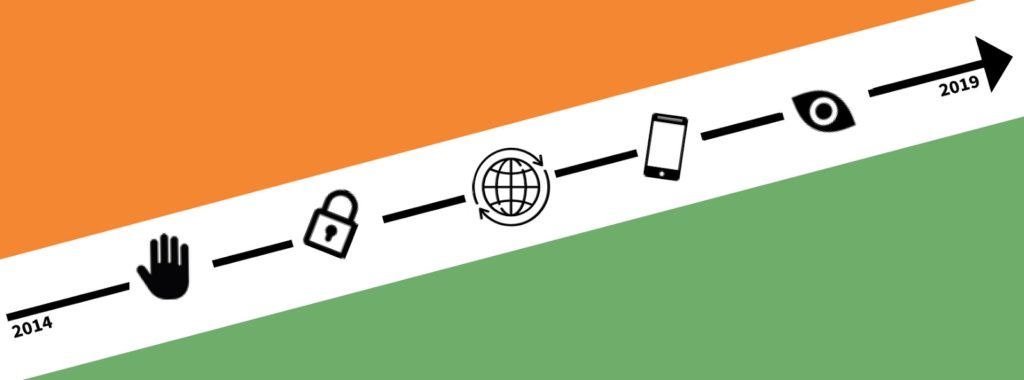India is witness to the largest democratic election in the world. The collective voice of more than 1.3 billion people of India is represented by the Members of Parliament (MPs) in the Lok Sabha (House of the People) and the Rajya Sabha (Council of States). India also has the second-largest number of internet users in the world and the majority of the next billion users of the internet will likely be from India. This means that the decisions made in India on digital rights will have a broad reach and deep impact for users at risk.
What is the status of digital rights issues in India’s Parliament?
Access Now has analysed the parliamentary interventions that Members of Parliament have made on digital rights, focusing primarily on sessions from the sittings of the two houses of the Indian Parliament from 2014-2019, as detailed in our report: Digital Rights in India’s Parliament: Five Years in Review. The report sheds light on the issues Indian MPs have previously considered important and when they have taken action, as well as identifying the most active MPs on digital rights in both Houses. This allows stakeholders to see what progress has been made, on what, and by whom, and where gaps remain for protecting Indians’ digital rights. The report is a part of the ongoing efforts of Access Now to analyse how representatives are engaging in digital rights issues (see media coverage here).
Our Asia Pacific policy team shared our findings on 6th August 2019 in an event, “Panel Discussion and Report Launch on Digital Rights in India’s Parliament,” organised in New Delhi in the presence of activists, academicians, scholars, parliamentarians, and other stakeholders who are part of India’s policy and rights community. The event began with a presentation of the report, followed by a panel discussion of digital rights experts, and a discussion with Members of Parliament.
The following are some of the major findings that were presented:
- Union Budget sessions proved to be more productive for digital rights issues than other parliamentary sessions.
- Legislative sessions tend to focus on some issues over others. For example, snooping and Net Neutrality in the 2015 budget session of 2015; Aadhaar in 2016 and 2017; and data protection in 2018.
- Lok Sabha saw more Private Member’s Bills (15) than the Rajya Sabha (4).
- There was an increase in privacy-related questions by 154% over five years.
- Lok Sabha shows more interest in surveillance and snooping than the Rajya Sabha.
- BJP leads in asking questions about privacy, with 71 MPs showing interest, followed by INC: 21 MPs, AIADMK: 21 MPs, and Shiv Sena: 11 MPs.
- The Champions of privacy during the 16th Lok Sabha were: Mr. S.P. Muddahanumegowda (INC) and Mr. Shrikant Eknath Shinde (Shiv Sena) by asking 6 and 5 questions, respectively.
- Over the past 10 years (2009 – 2019) in Rajya Sabha, Mr. Rajeev Chandrasekhar (BJP) and Mr. C.P. Narayanan (CPI), asked the most questions on privacy (14 and 9, respectively).
- The top MPs in Lok Sabha were: Mr. Tathagata Satpathy (BJD), Mr. Shashi Tharoor (INC), Mr. Baijayant Jay Panda (BJD), and Prof. Saugata Roy (AITMC).
- The top MPs in the Rajya Sabha were: Mr. Derek O’Brien (TMC), Mr. Rajeev Chandrasekhar (BJP), Mr. Sukhendu Sekhar Ray (AITMC), Mr. Jairam Ramesh (INC), and Mr. Tarun Vijay (BJP).
- Of all reports presented by the Standing Committee on Information Technology in the last five years, only a small number were on the digital rights issues it examines. This shows that despite an increased focus on digital rights, there is room for improvement and increased attention.
What happens next?
Access Now hopes that the Indian Parliament and its new MPs, elected in the 2019 General Elections, will continue working to safeguard human rights in the digital era and that, as an institution, the Indian Parliament will increase the substance and quantity of initiatives for protecting these rights. We also expect civil society organisations, activists, and citizens to unite their voices and work to strengthen the rights of Indian citizens in this digital age. We hope that our mapping research in this report will be helpful for all the stakeholders working to build or reinforce these rights.
We stand ready to help all stakeholders — including parliamentarians, political parties, civil society organisations, and citizens — work collectively to make India a global role model for supporting digital rights. Stay tuned for takeaways from us on the first session of the Indian Parliament in its first sitting after the 2019 General Elections.
